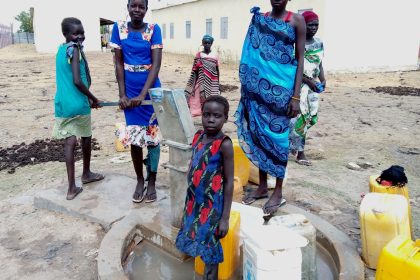IMF team assured by Uganda’s prospects as it backs $240m loan
 Medium-term prospects remain favourable with oil production coming on board by financial year 2024/2025 while headline inflation is expected to rise to 8.3 percent this fiscal year due to elevated commodity prices and higher imported input costs.
Medium-term prospects remain favourable with oil production coming on board by financial year 2024/2025 while headline inflation is expected to rise to 8.3 percent this fiscal year due to elevated commodity prices and higher imported input costs.
An International Monetary Fund (IMF) staff team which recently held virtual meetings with top Ugandan officials is recommending a further $240 million of IMF support funds as projected GDP growth rate will top five percent this financial year. The money will make up part of Uganda’s foreign reserves to strengthen balance of payments capability.
The team also spelt out the structural reforms needed to unlock the country’s growth potential in the wake of the Covid-19 pandemic. These include greater transparency in business ownerships and further measures to limit money laundering.
The latest review will lead to a disbursement of $240 million, as part of the previously approved $1 billion Extended Credit Facility (ECF) to Uganda once the IMF Executive Board accepts the recommendations made by the team. The total amount drawn to date will then reach $625 million since mid-2021. The review points out that Ugandan authorities continue implementing their reform program with key policy actions focusing on prudent fiscal and monetary policies, growth- and debt-friendly composition of spending and financing, safeguarding a resilient financial sector, and anti-corruption measures. These reforms are helping offset challenges from the unfavorable external environment and are improving prospects.
Led by Malhar Nabar, the team said Uganda’s economic recovery is underway despite roadblocks from global demand and supply-chain shocks that are affecting inflation and growth, constraining revenues and contributing to higher spending needs.
The regular reviews come under Article IV of the IMF’s Articles of Agreement requiring bilateral discussions with members, usually every year. Until the emergence of Covid-19, an IMF staff team visits the country, collects economic and financial information, and discusses with officials the country’s economic developments and policies.
Latest findings show Uganda’s growth is projected at 5.3 percent in financial year (FY2022/23), 0.7 percentage point lower than at the time of the first review in March reflecting weaker global demand and the impact of rising inflation and interest rates on domestic demand. Medium-term prospects remain favourable with oil production coming on board by FY 24/25.
Headline inflation is expected to rise to 8.3 percent this fiscal year due to elevated commodity prices and higher imported input costs and is anticipated to decline thereafter reflecting the expected easing of commodity price pressures and the impact of monetary tightening. Risks to the outlook are elevated and include lower global growth, persistently higher inflation in advanced economies and associated tighter global financial conditions; an intensification of the Ebola outbreak; and more frequent disruptions in activity due to climate change.
Uganda was declared Ebola-free during mid-January.
Nabar said, “Structural reforms remain key to unlocking Uganda’s growth potential. Priorities include strengthening the anti-corruption framework and the Anti-Money Laundering/Combating the Financing of Terrorism (AML/CFT) regime, improving the social safety net, advancing the financial inclusion agenda, and adapting to climate change.”
He said, “The anti-corruption agenda is progressing with the Companies Act amended to prepare the ground for the implementation of a beneficial ownership register allowing timely access to information. Tools for AML/CFT risk-based supervision for the financial sector are being developed and implemented. The authorities published information on compliance statistics for asset declarations and on applications to access the declarations, on the Inspectorate of Government’s website.”
“The Bank of Uganda (BoU) has tightened the policy rate in recent months and announced its readiness to take appropriate action to contain second-round effects of higher global prices. Given the broadening of inflation pressures and upside risks, continued tightening would help guide core inflation back to the target. Continued exchange rate flexibility is an important shock absorber and would help rebuild external buffers,” Nabar said.
He said, “Revenue-based fiscal consolidation enshrined in the authorities’ Domestic Revenue Mobilization Strategy remains crucial for keeping debt at a sustainable level and providing much-needed funds for Sustainable Development Goals. To this end, the authorities have adopted a plan to rationalize inefficient and costly tax expenditures. Expenditure prioritization will continue but a small widening of the fiscal deficit this year, relative to the target set in the first review of the ECF, is necessary to account for additional needs to support the vulnerable, including subsistence households, while remaining focused on fiscal consolidation. Uganda’s debt remains sustainable, with a moderate risk of debt distress.”
Nabar said, “The banking sector is well-capitalized, yet existing vulnerabilities point to the need for continued monitoring and strengthening of financial stability. The BoU is improving its supervisory framework. Implementation of the Safeguards Assessment recommendations will help solidify independence and the new risk management framework will address governance and contain risks.”

 African Heads of state head to South Korea next week for Summit talks
African Heads of state head to South Korea next week for Summit talks
 Trading leads as main source of income for Ugandans
Trading leads as main source of income for Ugandans
 New leadership for bankers’ umbrella as total assets top $12 billion
New leadership for bankers’ umbrella as total assets top $12 billion
 Uganda-Tanzania announce date for second joint business forum
Uganda-Tanzania announce date for second joint business forum
 Unpacking results-based financing: balancing strengths with weaknesses
Unpacking results-based financing: balancing strengths with weaknesses
 Big fish in small pond Stanbic notches up $100m profit for 2023 topping previous figure by 15%
Big fish in small pond Stanbic notches up $100m profit for 2023 topping previous figure by 15%
